Keynote Presentations:
Cultural Safety in Preconception, Prenatal and Child Health Services
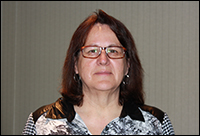
Dr. Margo Greenwood, Associate Professor, Department of First Nations Studies and Department of Education, University of Northern British Columbia

Cultural safety is an important topic in First Nations, Inuit, and Métis health. People who experience culturally safe services are more likely to access services earlier and to feel more at ease and empowered. As a result, they are more likely to share about their concerns and preferences and continue programming. Dr. Margo Greenwood provided an overview of cultural safety and practical tips for service providers about how to achieve it. This presentation focused specifically on cultural safety for service providers working on preconception, prenatal, and child health.
The Origins and Development of Early Mental Health: Why Recognizing and Responding to Early Mental Health Needs to be the New Normal

Dr. Chaya Kulkarni, Director, Infant Mental Health Promotion (IMHP), The Hospital for Sick Children
Today, there is a growing body of research in the areas of brain development, epigenetics, and toxic stress. These research findings have helped us understand how early adversity, neglect or trauma can impact a child’s mental health and physical health in the early years and throughout life. While this information is received with enthusiasm by those working with young children, our practices and policies don’t always reflect the very research that excites us or helps us understand the journey of an infant, toddler or preschooler who is experiencing challenges and whose behavior may even challenge his caregivers. We must become ambassadors of the new research and determine how our practice will be influenced by research related to infant mental health: every day, during every moments and interactions with young children, their families and those we collaborate with to best meet their needs. When young children are exposed to trauma, live in an environment that includes multiple risk factors, or have a biological predisposition that puts them at risk for poor mental health, all parts of the system need to respond. Who is monitoring early mental health – do we even know how many may be at risk? What happens when there is a vulnerability – are we recognizing and responding as early as the research tells us we should? Are there services for infants, toddlers and preschoolers experiencing vulnerability readily available and accessible? This session explored how the new science can be integrated into our practice, guide our policies, and ultimately, ensure the emotional safety of infants, toddlers and preschoolers who may be at risk for poor mental health – in the short and long term. One person can be a change agent – for a child, a family, or even within an agency. This presentation brought together the research, practice and policy related to supporting early mental health throughout our systems and services for young children and their families.
Being The Resilient Woman … Taking Care of YOURSELF at Work and at Home
Dr. Patricia O’Gorman, author of The Resilient Woman: Mastering the 7 Steps to Personal Power (2013), and 7 other books
Being resilient means stepping into your power – yes, taking care of business at work and at home – but by consciously using your strength to also care for yourself. Participants learned how to: seize crises as opportunities, tune into your own inner wisdom, and set HELPFUL boundaries, all by beginning to challenge those culturally shaped girly thoughts that rob us of our power due to our being too smart, too heavy, too assertive, or by our having a bad hair day. Participants had an opportunity to laugh and learn in this fun filled exploration into their “real you”.
Workshops:
A1 - Management of Perinatal Prescription Opioid Use
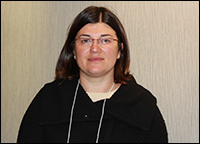
Dr. Alice Ordean, Medical Director, Toronto Centre for Substance Use in Pregnancy (T-CUP), St. Joseph’s Health Centre; Assistant Professor, Department of Family and Community Medicine, University of Toronto; Executive Director, PRIMA
This workshop addressed the issue of prescription opioid use during the perinatal period. The information presented was evidence-based and practice-informed. Best practices in managing prescription opioid dependence were reviewed along with examples and related resources.
The objectives for this session included:
- Reviewing the prevalence of prescription opioid use during pregnancy
- Reviewing an approach to the comprehensive management of opioid addiction in the perinatal period
- Discussing benefits and risks of pharmacotherapy options (methadone and buprenorphine) for opioid dependence during pregnancy
- Gaining an understanding of neonatal abstinence syndrome (NAS) and recommendations for management
A2 - Early Childhood Visual Development
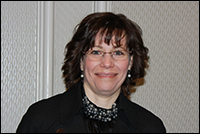
Dr. Catherine Chiarelli, Ontario Association of Optometrists

The presentation described the development of vision skills in children and how this impacts the achievement of physical, social, cognitive and academic milestones. Risk factors for vision problems were discussed. The prevalence, signs and symptoms of vision conditions were explained.
Participants learned how vision affects a child’s development and how to recognize children who may have a vision problem. The session aimed to raise awareness about the magnitude of uncorrected vision problems in young children and the need for comprehensive eye examinations at a young age.
Dr Chiarelli outlined the Ontario Association of Optometrists Junior Kindergarten children’s vision awareness program called Eye See…Eye Learn® which is funded by the Government of Ontario.
A3 - Overcoming Challenges on the Baby-Friendly Initiative (BFI) Journey
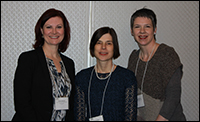 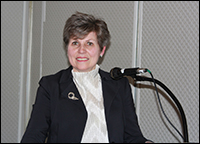
Susan Anderson, Director of Patient Care Services, Sioux Lookout Meno Ya Win Health Centre
Joan Bueckert, Registered Nurse, International Board Certified Lactation Consultant, Centretown Community Health Centre
Catharine Lowes, BFI Coordinator, Child Health, Family Health Division, Niagara Region
Linda Young, Director of Maternal Newborn Child, Mental Health, Interprofessional Practice and Organizational Learning, Toronto East General Hospital
Introduction to the BFI Strategy
Our Journey to BFI: Skin to Skin in the OR
Overcoming Challenges in Our BFI Journey
The Journey to Becoming Baby Friendly
Moving towards BFI designation can be a challenging and rewarding journey. This workshop provided practical examples of innovative strategies to overcome challenges. The presenters discussed their own personal challenges and success stories about issues such as: engaging all staff members to participate in the process, implementing skin-to-skin in the operating room and recovery room, working with newcomers, supporting formula feeding families, and promoting breastfeeding with teens and teachers. Each of the speakers brought a unique perspective based on their experiences in different parts of the province and with unique client groups (e.g., newcomers, Aboriginal populations, pregnant teens, etc.).
A4 - Consumer Products: Safety Issues and Information for Service Providers
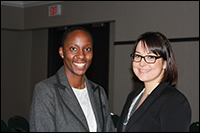
Sonia Douglas, Consumer Product Safety Officer, Consumer Product Safety, Health Canada
Joanne Brathwaite, Consumer Product Safety Officer, Consumer Product Safety, Health Canada
Many of us have experienced a health or safety issue after coming into contact with a consumer product, whether it involved a toy or household product. This presentation covered safety information and issues as they relate to consumer products, with a focus on children’s products. The presenters discussed the mechanical, chemical and flammability hazards associated with regulated products such as cribs, bassinets, playpens, strollers, pacifiers, blind cords, and toys, as well as unregulated products such as bath seats, button batteries and infant slings, and what can be done to keep Canadians healthy and safe.
A5 - This (Maybe) Changes Everything: Men and the Adjustment to Fatherhood

Brian Russell, Provincial Coordinator, Dad Central Ontario; Parent Education Worker, LAMP Community Health Centre
Dad Central: I’m a Dad
Fathers’ Feelings and Experiences during Pregnancy and Childbirth: A Qualitative Study
Ask most men and you will discover ideas, expectations, and hopes about family, their relationship with mom, and how fatherhood will change them. Supporting men from preconception to birth is important and there are ways to avoid potential future problems by addressing the transition to parenthood with them early on. For many men, a baby changes everything. This workshop looked at ways men adapt to fatherhood, how their relationship may be affected with birth, and provided ways to support and engage men in conversations that encourage them to be informed, involved, and intimately part of their growing families.
B1 - Embracing our Métis Families
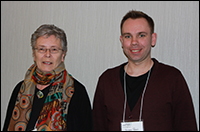
Simon Bain, Community Wellness Coordinator, Métis Nation of Ontario
October Fostey, Métis Healthy Babies Healthy Children – Coordinator, Healing and Wellness Branch, Métis Nation of Ontario, Windsor
This session provided an overview of the following:
- Métis – A unique culture
- MNO Services – wrapping around our families, clients and extended communities
- Métis Baby Bundle – (our 50%): Best Practices using the Métis Baby Bundle Book; Front line workers can focus on individual themes from the book to work with families (i.e., talking about how to get the children involved in cooking/meal planning); Journaling practise to keep stories alive for the child/baby; Creating memories for the child – stepping stones; Encouraging parents to think about the seriousness of their roles and responsibilities as parents (i.e., you are the baby’s/children’s constant Mentor – they are learning everything from you); How it is a resource to be used for workshop topics – encouraging the grandparents to attend with the young mothers
B2 - Optimizing Maternal-Fetal Outcomes – The Value of Appropriate Weight Gain For All Women and Their Children

Dr. Zachary M. Ferraro, Research Associate, Obstetrics and Gynecology, Faculty of Medicine, University of Ottawa; Part-Time Professor, Human Kinetics, Faculty of Health Science, University of Ottawa

This presentation guided the audience through an evidence-based review of the risks associated with maternal obesity and excessive gestational weight gain (GWG) and how this relates to child health. Additionally, appropriate rate of GWG and its effects on neonatal and downstream child obesity were addressed using two clinical scenarios: ‘early exceeders’ who exceed absolute recommendations at term and ‘early exceeders’ who stabilize and adhere to absolute recommendations at term. Strategies and tools designed to optimize maternal weight gain trajectory were discussed.
B3 - Seeing the Unseen - An Introduction to Health Equity Impact Assessment
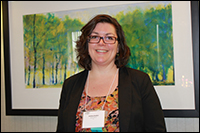
Andrea Bodkin, MPH, HC Link Coordinator, Health Nexus
This workshop provided participants with a hands-on orientation to the Ontario Ministry of Health and Long Term Care's Health Equity Impact Assessment (HEIA) tool. This easy to use assessment tool is designed to identify the inequities that can unintentionally result from our programs, policies and initiatives. In this workshop, the presenter explored the concepts of health inequities, where they come from and how they affect the people and populations we work with. Examples of how HEIAs have been used in the field of maternal and child health were explored. Participants then worked through a case study using the HEIA template. This hands-on workshop was of interest to individuals working in planning, policy, program or proposal development; as well as those who work at frontline service delivery.
At the end of the workshop, participants:
- Gained an understanding of what health equity is and how it impacts health
- Were able to identify vulnerable groups and potential unintended negative and positive consequences
- Had insight in how to develop strategies to mitigate the effects of health inequities
B4 - Radon in Indoor Environments: What You Can Do to Protect Children from an Important Lung Cancer Risk
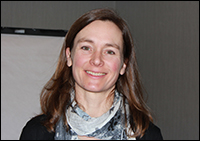
Erica Phipps, MPH, Partnership Director, Canadian Partnership for Children’s Health and Environment (CPCHE)
Radon is a naturally occurring radioactive gas that can build up to harmful levels in indoor environments. Long-term exposure to elevated radon is a leading cause of lung cancer in Canada. In this session participants learned about radon, where it comes from, the reasons for the concern, and how to find out if there are high levels of radon in a home, child care centre or workplace. Participants received a kit of informational resources on radon, and had an opportunity to hear about and discuss ways in which early years professionals can raise awareness and prompt action on this preventable health risk.
B5 - Working with Families to Promote Safe Sleep for Infants 0 – 12 Months of Age: A New RNAO Best Practice Guideline
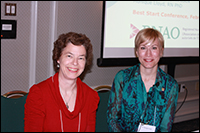
Vicki Bassett, Nurse Educator, Family Health Team, The Ottawa Hospital, Civic Campus
Christina Bradley, RN BScN, Public Health Nurse, Chronic Disease and Injury Prevention Division, Niagara Region Public Health
Monique Lloyd, RN, PhD, Associate Director of Guideline Development, Research and Evaluation, Registered Nurses’ Association of Ontario
Sudden Infant Death Syndrome (SIDS) is among the leading causes of infant death in Canada, attributed in large part to unsafe sleep practices. Although campaigns promoting supine sleep positioning have resulted in notable risk reduction, emerging evidence indicates that other modifiable risk factors may further reduce the incidence of sleep related death. It is a challenge, given the controversies related to the infant sleep environment, for health care professionals to understand best practice and to know how to effectively assist women and families in making decisions to support safe sleep. In order to address this issue, a clinical practice guideline has been developed by the Registered Nurses’ Association of Ontario (RNAO) as an evidence-based resource to improve the knowledge of health care professionals, inform and strengthen practice, and support organizational policy development with the ultimate goals of protecting infants in their sleep environment and reducing infant death. This presentation highlighted the best practices in infant safe sleep as synthesized from the literature, identified evidence gaps and discussed opportunities for future research. A nursing approach that supports informed client decision making was emphasized.
C1 - The Sacred Child Program
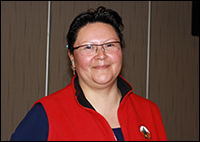
Elaine Kicknosway, Children and Youth Manager, Aboriginal Women's Support Centre, Minwaashin Lodge
Chief Seattle
Minwaashin Lodge Circle
Violence Against Aboriginal Women Support Centre
The Sacred Child Program
Participants learned about the Minwaashin Lodge. It provides a range of programs and services to First Nations, Inuit and Métis women and children (regardless of status) who are survivors of domestic and other forms of violence, and who may also be suffering the effects of the residential school system. All programs and services are provided in the context of cultural beliefs and values to ensure a holistic approach is used as part of the healing journey. The Sacred Child Program is a culturally-based program focusing on the holistic needs of children ages 0-6 years. Our goal is to recognize, enhance and celebrate the value and importance of the family and the roles of children.
Our program consists of:
- Positive Native Parenting for Caregivers
- Parental Relief of 3 hours maximum
- Effects of family violence on children who witness violence
- Team building for children
- Building positive self-esteem through arts and crafts
- Developing greater listening and communication skills through storytelling
- Social skills (being helpers, sharing, responsibilities, being safe)
We follow a calendar of teachings that are designed to enhance the lives of the children and families. Activities include medicine walks, drumming, regalia making, fun and games, ceremonies, feasts, visits from storytellers and Elders, and arts/crafts.
C2 - Engaging and Supporting Families

Janice MacAulay, Executive Director, The Canadian Association of Family Resource Programs
Getting Participants to Sign Up for Your Program
Getting Participants to Keep Coming
Helping Participants to Engage and Learn
Helping Participants to Use What They Learn
Helping Participants to Sustain Learning
“Family-centred,” “strengths-based,” “participatory”… these terms have frequently been used to describe good practice when offering services to children and their families. But what does this approach actually look and sound like? What factors prevent us from using these approaches consistently? This 3-hour workshop provided participants with some theoretical background relating to engaging and supporting families effectively. Most of the workshop was devoted to activities which hone participants’ skills and knowledge and bring these theories to life with examples from the participants’ experience.
C3 - Perinatal Mood Disorders: Translating Best Evidence into Practice: Current Research and the Northeastern Ontario Strategy
 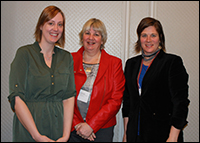
Dr. Cindy-Lee Dennis, Professor in Nursing and Medicine, Dept. of Psychiatry; Canada Research Chair in Perinatal Community Health; Shirley Brown Chair in Women’s Mental Health Research, Women’s College Research Institute; University of Toronto
Kathleen Jodouin
Linda Rankin (Ed D. Candidate), Coordinator of Regional Children’s Mental Health Program, North Bay Regional Health Centre
Jennifer Gordon, M.S.W. (cand), R.S.W., Coordinator, Northeastern Postpartum Mood Disorders Strategy, Community Counselling Centre of Nipissing
Northeastern Ontario Postpartum Mood Project
Best Evidence for the Detection, Prevention and Treatment of Perinatal Depression
This workshop presented the most current best evidence for the prevention, detection and treatment of perinatal mood disorders. A presentation of the newly developed Northeastern Ontario Postpartum Mood Disorder Strategy showed how current best evidence, inter-ministerial cooperation, community involvement and families with “lived experience” can be coordinated to develop a practical approach program development. The workshop included a discussion of advocacy measures needed to promote practical application in all Ontario settings.
Participants:
- Learned about current best evidence for the prevention, detection and treatment of perinatal mood disorders
- Learned about the recommendations from the newly developed North Eastern Ontario Postpartum Mood Disorder Strategy
- Heard the voices of families consulted in the process, as they outline what would have helped them in their recovery
- Discussed how to apply proven approaches and evidence-based tools to create better outcomes for families affected by perinatal mood disorders in Ontario.
C4 - Integrating Social Media in Your Work – Update on Tools, Current Public Health Examples, and the Next Steps
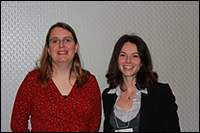
Robyn Kalda, Health Promotion Specialist - Technology Specialization, Health Nexus
Melissa Potvin, Communications Coordinator, Health Nexus
Social Media Measurement
Creating a Social Media Plan
Social Media Pointers
Creating a Social Media Policy
Social Media Starter Sheet
This social media workshop required that participants have a general understanding of social media, as well as the key elements needed for any social media plan and policy. We looked at the tools and resources needed to put participants’ social media plan into action. The sharing of present day trends and examples helped participants understand the possibilities available through social media.
Participants left the session with a better understanding of:
- Current trends in social media
- Popular tools
- Ways that organizations have creatively used social media
- Concrete steps in implementing your social media plan
C5 - How Community, Family and the Environment Shape Children and What We Can Do About It through A Social Pediatrics Approach
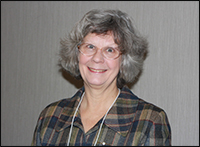
Dr. Lee Ford-Jones, Professor of Pediatrics, Social Pediatrics and Infectious Diseases, University of Toronto
Antibiotics without Food
Child Poverty: A Practical Tool for Primary Care
“How did you sleep last night? Have you eaten today?”
The Impact of Poverty on the Current and Future Health Status of Children
Shedding Light on the Long Shadow of Childhood Adversity
Addressing the Social Determinants of Health within the Patient-Centered Medical Home
Keeping Track: Child Developmental Support Record
A Better Understanding of Mortality in Young People
About the Let’s Get Started Program
Let’s Get Started Programs
From Medical Home to Health Neighborhood
Publicly Funded Optometric Services in Ontario
Office Interventions for Poverty: Child Health
Paediatric Palliative Care and the Social Determinants of Health
Brochure: Take care of your income!
Poverty: A Clinical Tool for Primary Care in Ontario
Social Paediatrics and Early Child Development – The Practical Enhancements: Part 2
Speech and Language Support
Spotlight on Middle Childhood: Rejuvenating the ‘Forgotten Years”
Toronto Early Childhood and Family Resource System
Taking a Second: Reflection on Social Pediatrics
Major influences on child health are rooted in the social determinants of health. Life course models, viewing health as a developmental process, provide a new perspective on social determinants of child health. Effective interventions to minimize the adverse effects of poor social conditions on life course development need to take account of the interaction between the social environment and biological processes. Social determinants of child health are also very relevant to pediatrics as part of the causal pathways of pediatric disease and in relation to access to high-quality healthcare. Approaches through professional education, interprofessional clinical activity and advocacy, with the community and influencing policy change were discussed.
Special Conference Events:
Aboriginal Networking Session
This networking event provided an opportunity to exchange ideas and resources. It also included a craft and an Aboriginal teaching.
Réseautage en français!
Durant la pause du dîner de la pré-conférence en français il y avait une session de réseautage pour les francophones fournissant une opportunité d’échanger des idées et des ressources. Les participants étaient encouragés à discuter des thèmes associés à leur travail en milieu francophone. Cette session informelle a été facilitée par Louise Choquette et Marie Brisson, consultantes bilingues en promotion de la santé, Centre de ressources meilleur départ, Nexus santé.
|
